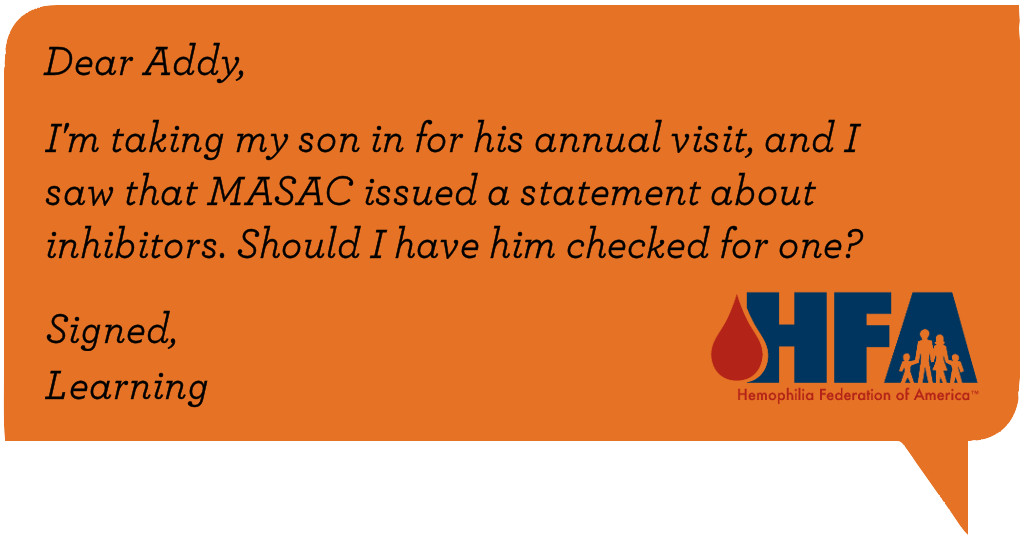
Dear Addy,
I’m taking my son in for his annual visit, and I saw that MASAC issued a statement about inhibitors. Should I have him checked for one?
Signed,
Learning All I Can
Dear Learning,
Inhibitors are antibodies that the immune system develops in response to a clotting factor product used to treat a person with hemophilia. The body sees infused clotting factor as a foreign substance that needs to be destroyed. To neutralize the foreign substance, the body produces antibodies (proteins) that attach themselves to the factor before it has time to stop the bleeding. As a result of the body inhibiting the factor from helping to stop a bleed, bleeding episodes can last longer and are often more painful for people with inhibitors.
While inhibitors occur most-frequently in severe hemophilia A patients (an estimated 30% will be affected by an inhibitor in their lives), mild patients are not immune to inhibitor development; approximately 5-8% of mild and moderate hemophilia A patients develop inhibitors as well. For patients with hemophilia B, there is a lower chance of developing an inhibitor (2-3%), but about half of these inhibitor patients will develop an anaphylactic reaction to infused Factor IX. These reactions can be life-threatening.
In May 2014, the Centers for Disease Control and Prevention (CDC) released the findings of their six year study on inhibitors. This study found that anyone can get an inhibitor, and everyone should be tested. Though inhibitors usually form between the 5th and the 50th infusion of factor concentrate, they can also develop later in life. This is the study that NHF’s Medical and Scientific Advisory Council (MASAC) was responding to in their October 2015 recommendation.
While some inhibitors can go away on their own, most patients work with their doctors to formulate individual treatment protocols. Using this guidance and detecting an inhibitor early are the keys to beating an inhibitor. That’s why it’s so important for your son to be tested for this condition at their annual checkup.
If you want to learn more about inhibitors, including identified risk factors and treatment options, be sure to visit HFA’s Inhibitors page and watch the August 2015 webinar on inhibitors. You also can see how some patients have lived with and fought through inhibitors in the August 2015 HFA Young Adults Hangout. Lastly, be sure to take a peek at the information presented in the inhibitor track presentations from the 2014 and 2015 HFA annual Symposium.
Sincerely,
Addy
Have a question? Click HERE. Your name will be changed in the response.
HFA frequently receives questions from the bleeding disorders community related to advocacy issues. The questions often impact the entire community. In an effort to reach the largest audience possible with our responses to these widely applicable questions, HFA developed “Dear Addy.” Questions submitted to this column are edited in order to protect privacy and should be considered educational only, not individual guidance.



